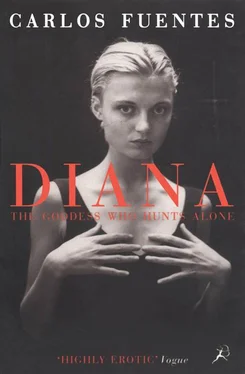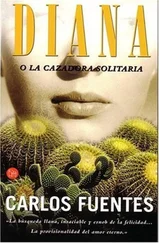Carlos Fuentes - Diana the Goddess Who Hunts Alone
Здесь есть возможность читать онлайн «Carlos Fuentes - Diana the Goddess Who Hunts Alone» весь текст электронной книги совершенно бесплатно (целиком полную версию без сокращений). В некоторых случаях можно слушать аудио, скачать через торрент в формате fb2 и присутствует краткое содержание. Год выпуска: 2012, Издательство: Bloomsbury UK, Жанр: Современная проза, на английском языке. Описание произведения, (предисловие) а так же отзывы посетителей доступны на портале библиотеки ЛибКат.
- Название:Diana the Goddess Who Hunts Alone
- Автор:
- Издательство:Bloomsbury UK
- Жанр:
- Год:2012
- ISBN:нет данных
- Рейтинг книги:3 / 5. Голосов: 1
-
Избранное:Добавить в избранное
- Отзывы:
-
Ваша оценка:
- 60
- 1
- 2
- 3
- 4
- 5
Diana the Goddess Who Hunts Alone: краткое содержание, описание и аннотация
Предлагаем к чтению аннотацию, описание, краткое содержание или предисловие (зависит от того, что написал сам автор книги «Diana the Goddess Who Hunts Alone»). Если вы не нашли необходимую информацию о книге — напишите в комментариях, мы постараемся отыскать её.
Diana the Goddess Who Hunts Alone — читать онлайн бесплатно полную книгу (весь текст) целиком
Ниже представлен текст книги, разбитый по страницам. Система сохранения места последней прочитанной страницы, позволяет с удобством читать онлайн бесплатно книгу «Diana the Goddess Who Hunts Alone», без необходимости каждый раз заново искать на чём Вы остановились. Поставьте закладку, и сможете в любой момент перейти на страницу, на которой закончили чтение.
Интервал:
Закладка:
Ivan Gravet answered me affectionately. He was not offended by my little quotation from Marlowe’s Jew of Malta. We were writers and men of the world. I had to understand two things about Diana’s fate. Diana and he had never protested the FBI’s lies, never succumbed to a surge of the racism in their Caucasian genes. There had been no doubt that the FBI had played that card. To protest the libel could have been taken as disgust for or rejection of a black baby. They, Diana and Ivan, saw the trap. But Diana’s anger was directed against the political manipulation of her sex. The FBI had reduced her to a sex object. It had presented her as a white woman hungry for a black man. Besides, finally, it was untrue. The father wasn’t black — as he and I know well. Nor was the baby.
“Did she have to exhibit it in Jeffersontown? I didn’t think public opinion there mattered to her.”
“It did. She never wanted to be judged as a schizoid personality — the small-town girl split between home, family, spiritual peace, middle-class stability, Christmas and Thanksgiving, and all the rest …”
“Did she have to photograph the child’s body? It seems to me a—”
“She had to be the witness to her own death. That’s all. She wanted to see how she would be seen if she came back to her town dead. She wanted to see the faces, hear the comments while she still could. That baby was a substitute Diana. See? The wench died in her own country. And she dies all the time.”
“Forgive me. Je suis désolé,” I said and remembered Diana.
He squeezed my arm. “She wanted to respond to oppression with something more than politics, which she didn’t understand. She thought sexuality and the romantic life would be her contribution to a world filled with both. She didn’t realize that one thing leads to another. You know? Rebellion leads to sexual excess, which leads to alcohol, alcohol to drugs, drugs to terror, to violence, to madness …”
“Then she will have to be judged just as she didn’t want to be judged — as the small-town girl who couldn’t resist the evil of a world she was unprepared for…”
“No. I loved her. Excuse me: I still love her.”
“I don’t anymore.”
“She was politically naïve. I warned her many times that democratic governments know that the best way to control a revolutionary movement is to create it. Instead of embodying it, the way totalitarian regimes do, they invent and control it and thus have an enemy they can count on. She never understood that. Again and again, she fell into the trap. The FBI decided to finish her off with a huge laugh.”
“I thought you were going to defend her.”
“Of course. Dear friend, Diana Soren was an ideal being. She epitomized the idealism of her generation, but she was incapable of overcoming a corrupt society and an immoral government. That’s all. Think of her that way.”
We heard the happy voice of Gabriella calling for us in the maze, summoning us in to lunch …
XXXIII
It was Azucena who told me the most terrible version of Diana’s end. I ran into her quite by chance on the Ramblas in Barcelona sometime in the mid-1980s. I was visiting my friend and literary agent Carmen Balcells on a mission of mercy. I wanted to ask her to support the Ecuadoran novelist Marcelo Chiriboga, unjustly overlooked by everyone but José Donoso and me. He had a minor post in the Foreign Ministry in Quito, where the altitude was suffocating him and the work left him no time to write. What could we do for him?
Seeing Azucena reminded me of the days we’d spent in Mexico and the pleasant experience of her always dignified presence. As we walked toward Paseo de Gracia, where I was staying, she spoke with her head lowered, giving a grim, objective account of the events, which, out of respect for Diana and herself, she did not want to cheapen with sentimentalism.
Azucena went to the United States with Diana for the baby’s funeral in Jeffersontown. On the flight from Paris to New York and then on to Iowa, Diana was calm, with a distant, almost beatific smile on her face, imagining the body in the white coffin that was with her on this trip, a trip she’d made dozens of times before. But on the return flight, from JFK to De Gaulle, something horrible happened. Diana excused herself to go to the lavatory. Three minutes later, she came screaming and running down the aisle, naked. No one dared to touch or stop her until a powerful black man intervened. He wrapped her in a blanket and returned her, suddenly calm but staring intently at the man’s eyes, to her seat next to Azucena in first class. Azucena gave her some sleeping pills and assured the stewardesses that Diana would sleep for the rest of the flight.
She stayed quietly in Paris for some time, sharing the apartment on Boulevard Raspail with Ivan, whom she no longer had relations with. She preferred to pick up boys in bars and hotels, especially hippies with a spiritual air and a dedication to drugs, which she then began, of course, to use seriously, as if they were the next step in her spiritual maturation and her rebellion. But she also belonged to an alcohol culture, and Diana was not a woman who would abandon an earlier phase in her life when she was diving into a new one.
From what Azucena told me, I came to understand an important truth about my old, momentary lover. She loved everything, but not greedily or egoistically. On the contrary, she loved things as a form of generosity toward herself but also toward the world or worlds she was living in. The provincial world of the Midwest and Hollywood, the intellectual world her husband offered her in Paris, the rebellion of the 1960s, liberal causes, the Black Panthers, the Mexican revolutionary — she collected all these worlds so they would go on being hers, but, most of all, so that none would consider her an ingrate, unable to take responsibility for her past. The past was an unfulfilled obligation that she had to bear, even if she failed.
“Is that why she wouldn’t sacrifice anything? Is that why she went back to Iowa with the dead baby?”
“I don’t know,” Azucena said simply. “The truth is that Diana suffered greatly. She would get in trouble and never get out except by getting in more trouble.”
She wanted to stay thin so she could go back to movies. Quick diets made her weak and strained her nerves. To quiet her fears, she would drink more. The alcohol would make her fat. So she’d use more drugs to get thin and stop drinking. She was in and out of one clinic after another. In one, she would dedicate herself to repeating again and again the simplest gestures and tasks. Azucena would visit her every day and see her get up, go to the bathroom, urinate, defecate, eat her breakfast, wash her clothing in the sink, straighten her bed, and climb back in it. But each of those acts, each one, would take two to three hours and wear her out. After sweeping the room, she would sleep till the next morning, when she’d get up, go to the bathroom, and begin the round all over again.
She would stare at Azucena during these times, with a mixture of attitudes and emotions. She would watch her out of the corner of her eye to make sure that Azucena was looking at her, that she was aware of what she was doing, and, most important, that she was approving, applauding her effort and the importance of each one of her actions …
For a long time she stayed in a sanatorium near Paris, overlooking the river. All one could see from her window was factory chimneys. There, Diana set about rediscovering her face, tracing it with her hand in the mirror, as if she were trying to remember herself. That act became a daily ritual. The permanence of her features seemed to depend on it. Without that ritual, Diana would have lost her own face.
Читать дальшеИнтервал:
Закладка:
Похожие книги на «Diana the Goddess Who Hunts Alone»
Представляем Вашему вниманию похожие книги на «Diana the Goddess Who Hunts Alone» списком для выбора. Мы отобрали схожую по названию и смыслу литературу в надежде предоставить читателям больше вариантов отыскать новые, интересные, ещё непрочитанные произведения.
Обсуждение, отзывы о книге «Diana the Goddess Who Hunts Alone» и просто собственные мнения читателей. Оставьте ваши комментарии, напишите, что Вы думаете о произведении, его смысле или главных героях. Укажите что конкретно понравилось, а что нет, и почему Вы так считаете.












